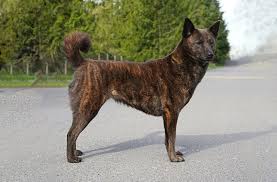
Kai Ken
Conditions of detention
Kai Ken dogs are highly adaptable and can live in various environments, including urban settings, as long as they receive sufficient exercise and mental stimulation. They thrive in homes with secure, fenced yards where they can roam and play.
Useful Fact: Kai Ken dogs are excellent climbers and swimmers, making them well-suited for outdoor adventures and activities.
Nutrition and diet
A balanced diet rich in high-quality protein, fats, and essential nutrients is vital for a Kai Ken’s health. Both commercial dog food and well-prepared homemade diets can meet their nutritional needs.
Useful Fact: Kai Ken dogs may benefit from a diet that includes fish, aligning with their traditional Japanese diet and providing essential omega-3 fatty acids.
Health
The Kai Ken is a generally healthy breed with a lifespan of 12-15 years. They are robust dogs but can be prone to genetic conditions such as hip dysplasia and certain eye issues.
Useful Fact: Regular vet check-ups, a balanced diet, and maintaining a healthy weight are essential for preventing common health problems in Kai Ken dogs.
Grooming and care
Kai Ken dogs have a double coat with a distinctive brindle pattern, which comes in black, red, or a mixture of both. Their medium-length coat requires regular brushing to manage shedding and maintain its health. They shed moderately throughout the year and more heavily during seasonal changes.
Useful Fact: Regular brushing, at least once a week, helps to keep the Kai Ken’s coat clean and reduces shedding.
Education and training
Kai Ken dogs are intelligent and eager to learn, but they can be independent and sometimes stubborn. Consistent, positive reinforcement training methods work best.
Useful Fact: Early socialization and obedience training are crucial for Kai Ken dogs to help them become well-mannered and adaptable adults.
Toys and entertainment
Kai Ken dogs enjoy toys that challenge their minds and provide physical exercise. They particularly love interactive toys, puzzle games, and activities that mimic hunting.
Useful Fact: Providing a variety of toys and engaging in regular play sessions can help keep a Kai Ken mentally and physically stimulated.
Safety
Ensure your Kai Ken has a secure, fenced yard to prevent them from wandering, as they have strong hunting instincts and can be adept escape artists.
Useful Fact: Kai Ken dogs are naturally alert and make excellent watchdogs, but their protective instincts should be managed with proper training and socialization.
Accessories
A sturdy leash, comfortable harness, and ID tags are essential for your Kai Ken’s safety during walks and outings.
Useful Fact: Kai Ken dogs benefit from wearing a harness rather than a collar, as it helps distribute pressure evenly and prevent neck strain during walks.
Socialization
Early and continuous socialization is crucial for Kai Ken dogs to ensure they are comfortable around people, other dogs, and different environments.
Useful Fact: Positive socialization experiences from a young age can help Kai Ken dogs develop into well-adjusted adults, reducing the likelihood of fear or aggression.
Travel and Transportation
Kai Ken dogs can travel well if accustomed to it from a young age. Ensure they have a comfortable crate or seatbelt harness for car rides.
Useful Fact: Regular short trips can help your Kai Ken become more comfortable with travel and reduce anxiety during longer journeys.
Behavior and psychology
Kai Ken dogs are known for their loyalty, independence, and strong hunting instincts. Understanding their behavior and providing appropriate outlets for their energy is important.
Useful Fact: Mental stimulation through training and interactive play is as important as physical exercise for a Kai Ken’s well-being.
Legal aspects
Owning a Kai Ken may come with specific legal requirements depending on your location, such as licensing, microchipping, and adherence to leash laws.
Useful Fact: Research local regulations and ensure you comply with any breed-specific legislation or requirements.


